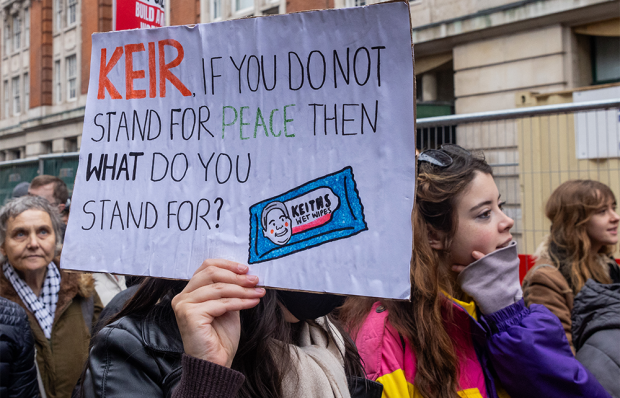From abroad I’ve returned to a country where, in language to which the word ‘shrill’ hardly does justice, fellow British commentators have been letting fly on both sides of the argument about Gaza and how Israel should or should not respond to Hamas’s unspeakable attacks on 7 October.
There’s just one thing both sides – the British Muslim banner-wavers and those who bay for a war of attrition in Gaza – seem to agree upon: that whatever the answer might be, it is, in the most important sense of the word, simple. It is not simple. Things so rarely are. The simple bit is who – in the immediate – is right and who wrong, and few of us need reminding of the answer here. But it’s the hard bit that matters: can a remedy be found by the means proposed?
I’m a columnist who believes that ‘ought’ implies ‘can’. That’s why it seemed to me as a youth that the United States should desist from trying to napalm communists out of Vietnam; why as an adult I argued against intervention in Iraq, Afghanistan, Syria and Libya. I understood very well the moral argument for cleansing these places of foolish, dangerous or wicked forces, but doubted the practicalities. For me, if the practical proposition fails, the moral argument falls at the last fence; and all talk of what justice demands, however heartfelt, becomes useless.
Worse than useless, in fact. It can be dangerously counterproductive. You will search hard to find a commentator more scathing than me about the alliance between parts of the Labour left, anti-Semites, and vicious, bigoted and militant elements among pro-Palestinian Muslims. These are a dark shadow in our country. But around that shadow is a large and soft penumbra of people of all faiths and races whose sympathies have been engaged – you may say naively – by the historic sufferings of the Palestinian people. And what could be better calculated to drive the naive into the arms of the malicious than sentiments like these:
‘If you stand in Britain with a Hamas flag, you should not be allowed to be free in Britain. You should be arrested. Have your citizenship withdrawn. Your passport withdrawn. You should be deported. You should be sent to Gaza and try your luck there.’
I have been disturbed by the language from my fellow columnist Douglas Murray. I read with admiration Peter Oborne’s cry for conciliation from the Christian quarter of Jerusalem, but Douglas’s effort to dial up the righteous anger needs to be taken head-on. There are moments in history to dial down, and this is one of them.
He got his cheers. But if we really started trying to arrest and deport people who joined a demonstration where Hamas flags were seen, or who even joined choruses of ‘jihad’, surely you can guess the consequences? Hundreds of thousands more would join in solidarity with these so-called martyrs. Jihad is just a word, a stupid word, meaning more, or less, depending on whose mouth it’s in. Do we want to raise it up to the status of a signifier with the plight of civilians in Gaza? Be careful what you wish for, Douglas. You’ll have a million ready to chant it.
‘It is not the right of non-Israelis to tell the Israelis what to do,’ he writes. ‘It is up to them to do what they need to do… Whatever we can do to support them, we must do.’ Steady on. Are the people of Israel all sure what they ‘need to do’? We’re talking about a vigorous democracy here. There are people in Israel who fear their country may be walking into a military trap in Gaza and worry, too, about risking that most precious of Israel’s assets: international sympathy. Benjamin Netanyahu (to whom Douglas has, he allows us to understand, talked privately) plainly thinks he knows what to do, but does Netanyahu speak for them? And if not, may not we?
Douglas complains we’re extending the right to free speech to people who would not extend it to us. To me, this is the acid test of your belief in freedom. It’s why I’ve consistently opposed laws against ‘hate speech’, including violently, even provocatively, hateful speech against people like me. I had thought of Douglas as a fellow critic of the cancelling of unwelcome opinion. His turn-around is curiously un-self-aware.
Not, however, as un-self-aware as what follows. In a separate event, at a memorial event for the dead of 7 October at a London synagogue, Douglas said he had spoken ‘in private’ to the late Jonathan Sacks, who told him that ‘to be a Jew is to have a sense of memory’. I’m afraid that to be a Palestinian Arab is to have a sense of memory too. Isn’t memory part of the root of this whole awful business? Give me, oh Lord, a little less memory and a lot more willingness to start from now.
A more temperate (and to me more moving) critique of our national response to events in Israel and Gaza came from Hadley Freeman in the Times, but there was a note there too that disturbed me. Freeman’s column was almost plaintive, headlined ‘Unspeakable slaughter, but I’ve seen nobody flying an Israel flag’. There were many Ukrainian flags.
This does bear thinking about. As (she says) a liberal Jew, she acknowledges that there is Palestinian as well as Israeli history. But then she turns on us, the worried bien-pensants in the middle. And her anger with us, like Douglas’s, is palpable: for not ‘coming down’ (she thinks) on Israel’s side. The never-quite-voiced hint in her column is those who stand back may betray incipient anti-Semitism. ‘It’s very sad but it’s complicated, say the more nervous ones, stroking the Ukraine flag emoji on their social media handle for reassurance that they’re a good person.’
Well it is complicated. It is not to belittle Jewish hurt and rage, the innocence of those slaughtered by Hamas, or the wickedness of Hamas themselves, to say that where people do believe in their cause, retaliatory slaughter may sow dragon’s teeth. So yes, it’s complicated; and no, Douglas and Hadley, I’m not an anti-Semite. And millions of us, troubled about what should be done next, would resent that suggestion very much.
Got something to add? Join the discussion and comment below.
Get 10 issues for just $10
Subscribe to The Spectator Australia today for the next 10 magazine issues, plus full online access, for just $10.
You might disagree with half of it, but you’ll enjoy reading all of it. Try your first month for free, then just $2 a week for the remainder of your first year.















Comments
Don't miss out
Join the conversation with other Spectator Australia readers. Subscribe to leave a comment.
SUBSCRIBEAlready a subscriber? Log in